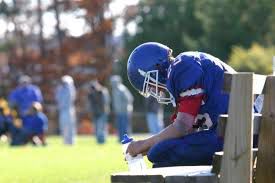Mental health in college athletics, formal support systems needed

Mental health in college athletics, formal support systems needed
September 26, 2017
In January 2013, the NCAA released a statement outlining its commitment to combat the prevalent issue of mental health in college athletes. Since then, the NCAA has produced studies, handbooks, seminars and other resources to help athletes, coaches and athletic administrators effectively respond to symptoms of anxiety and depression in student-athletes. This includes recommending a full-time licensed sports psychologist in athletic departments. Despite this, symptoms of depression and anxiety remain a persistent reality for many college athletes.
According to an ESPN study, fewer than 25 DI athletic programs have a full-time licensed psychologist or mental-health practitioner within the athletic department. The University is not one of the 25. Yet, trainers, physical therapists, chiropractors, etc., are readily available to treat any and all physical ailments. The contrast of resources available to student-athletes for physical injuries and mental rehabilitation is striking.
Physical injuries like stress fractures or torn ACLs cannot be ignored like emotional injuries. Athletes will push themselves through physical injury in fear of being labeled “weak.” This fear could amplify when an athlete attempts to cope with symptoms of anxiety and depression amidst unrelenting pressures to perform. A study conducted through University of Michigan’s Athletes Connected program found that only 10 percent of student-athletes struggling with symptoms of anxiety and depression seek help, compared to 30 percent of non-athlete students. The culture of sports affects how athletes cope with emotional injures. This is why student-athletes, on average, are much less likely to seek help in comparison to non-athlete students.
By listening to athletes speak about their biggest stressors, the culture of athletics becomes obvious through frequently heard statements like: “showing emotion during practice or competition means I am weak,” and “I’m a disappointment to my coaches and parents if I don’t perform well.”
The expectations placed on athletes to separate emotion and performance, especially at the elite collegiate level, reinforces the culture on sports teams that stigmatizes mental health issues and creates closed-door policies. Instead of support, athletes are bombarded by messages from coaches, teammates and athletic administrators to toughen up, mask emotion and other unhealthy coping mechanisms.
The ‘deal with your problems and don’t talk about it’ culture prevalent on many athletic teams undercuts the likelihood of an accessible support system for athletes to seek help. Athletic departments must prioritize the de-stigmatization of mental health concerns through formal resources that help athletes develop healthy coping mechanisms. The NCAA itself recommends a licensed mental health professional sympathetic to the cyclical progression of anxiety and depression in athletes, the unique pressures experienced by student athletes and the culture of sports teams. Student-athletes will be happier and perform better if symptoms of depression and anxiety are treated as effectively and fully as physical injuries.
Sometimes, athletes do not acknowledge symptoms or try to cope with them on their own. Inevitably, unhealthy coping mechanisms fail and the confidence and performances of athletes will suffer and symptoms will worsen. Frequently, negative self-talk traps athletes who do not seek help in a vicious cycle of anxiety, low self-esteem and poor performance.
Competitive sports naturally create stress from high expectations to perform. These expectations stem from coaches, parents, teammates and the athletes themselves. However, when the necessary expectations cause high stress and anxiety, student-athletes should have specialized counseling to help them manage it, before normal stressors morph into debilitating mental health concerns.
The identity or self-esteem of an athlete is anchored on the success achieved in his or her athletic careers. Recognizing an inability to cope with anxiety is often construed as failure. This is what needs to change in the culture of athletics, before the athlete feels hopeless. Communication should not merely advise athletes to be “mentally tough” or to “think positively.”
As a former athlete here at the University, I am familiar with the cycle of stress that competitive environments breed and the consequences of failing coping mechanisms. I found myself trapped under the expectations from coaches and the pressure I placed on myself. I struggled with anxiety and depression for two years without registering how debilitating it was. My performances and confidence suffered tremendously as I tried to “tough it out.” Once I realized how difficult it became for me to cope with any stress, I felt like a failed athlete.
Although Villanova’s counseling program is accessible, it is not equipped to be fully sympathetic to the significant pressures, the cyclical development of anxiety, and coping mechanisms specific to athletes struggling with mental health symptoms. Therefore, it is necessary for the Villanova Athletic Department to include a sports psychologist who understands the culture of sports and will facilitate healthy communication between athletes and coaches.
I am imploring the Villanova Athletic Department to challenge the stigmatization of mental health issues that is bred from the culture of sports. Providing student-athletes with the best possible experience should include access to specialized sports psychologists and coaches who are knowledgeable in healthy and effective strategies to help their athletes cope with common symptoms of anxiety and depression. Athletes who do not have access to formal support systems within the athletic department suffer complex and persistent emotional injuries. Awareness and strong support systems within athletic teams will help student-athletes succeed in competition and in life.






